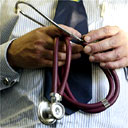
The General Medical Council (GMC) will lose its authority to decide on whether doctors are fit to practice, under government plans announced today.
The white paper, which also calls for doctors to undergo checks every five years to make sure they are still competent, calls for similar reforms to professional bodies regulating other health professionals, including dentists, pharmacists and nurses.
The changes come after an inquiry into the Harold Shipman murders that found the GMC was more concerned with protecting doctors' interests than those of the public.
Under the reforms, the GMC will lose its current right to adjudicate in fitness to practice cases when complaints are made against doctors.
It will still investigate concerns about doctors but will lose the final say on what happens to a doctor, with an independent tribunal taking over this role. Decisions to remove doctors from the GMC register will be decided on a lower burden of proof, with balance of probability replacing the current "beyond all reasonable doubt".
Under the proposals, the issuing of death certificates will be placed under new scrutiny by a medical examiner and regular checks will be carried out to ensure doctors are still fit to work.
The GMC and other professional bodies will also have to be made up of equal numbers of independently appointed professionals and members of the public, and will be more accountable to parliament.
The GMC will retain power over undergraduate education, although its management structure will change.
The health secretary, Patricia Hewitt, called the changes "radical and significant", adding: "They enable us to put an end to the disagreements of the past and to focus clearly on patient safety and public and professional confidence.
"People in the UK still rightly hold the health professions in the very highest regard. We take for granted that they deliver excellent care as a matter of routine," she said.
"It is therefore even more bewildering when that trust is betrayed. These rare cases of abuse have reminded us that even members of caring professions can fall away from the high standards to which they commit themselves. "
The GMC said it backed the recommendations and would "work constructively to achieve a smooth transition to the new arrangements".
The use of an independent body to adjudicate on cases was "an incremental change" given that the GMC had already introduced its own impartial panels, the GMC president, Sir Graeme Catto, said.
However, the British Medical Association (BMA), which represents doctors, said the plans could damage clinical independence.
"Sadly, the white paper proposals could lead to a climate of defensive medicine in which doctors are forever looking over their shoulders instead of concentrating on working in the best interest of their patients," the BMA chairman, James Johnson, said.
He also criticised the lower burden of proof in disciplinary cases.
"Removing a doctor from the GMC register means he or she loses not only their job but their entire way of earning a living," he said.
"With such serious consequences it cannot be right to rely on a mere balance of probabilities, rather than the current standard of proof of beyond reasonable doubt."
The changes, which will not be debated by parliament, follow the publication in July last year of a review of the role of the GMC by the chief medical officer, Sir Liam Donaldson.
It followed severe criticism of the role of the GMC in a 2004 report by Dame Janet Smith, who chaired an inquiry into the Shipman murders.
Shipman, a GP in Hyde, Greater Manchester, is believed to have killed up to 250 people, mostly elderly patients he injected with opiates, between 1971 and 1998. In 2000 he was convicted of 15 murders, and in 2004 he killed himself in jail.
Dame Janet stopped short of directly blaming the GMC for failing to detect Shipman's killing spree but said the culture in the medical profession was too focused on doctors' interests.

